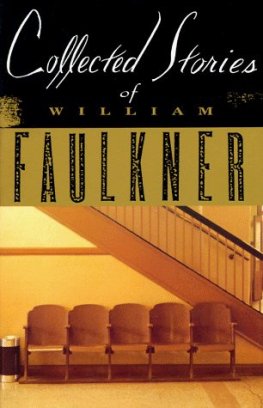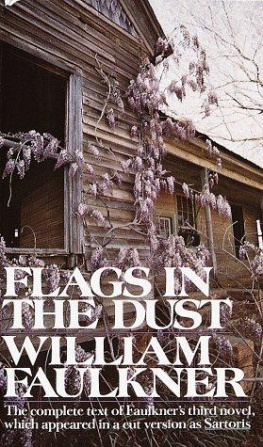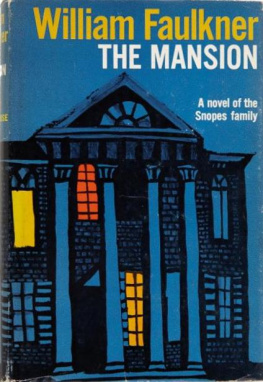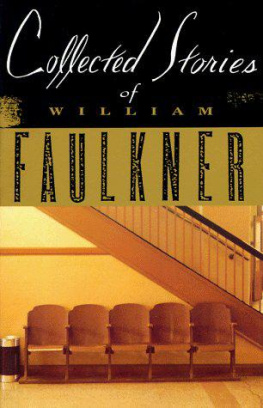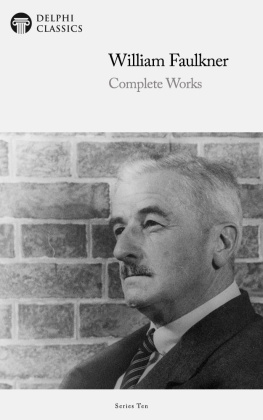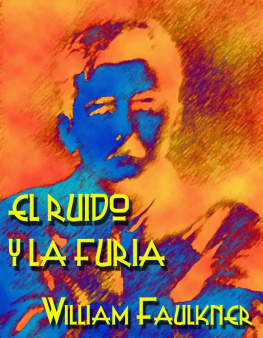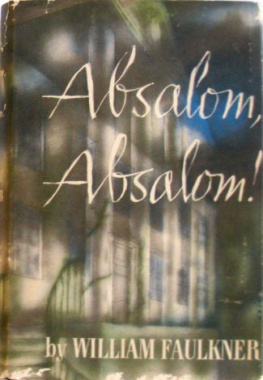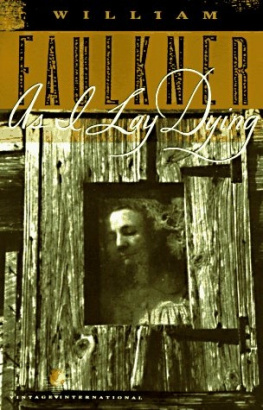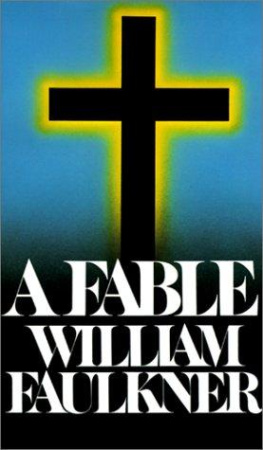William Faulkner - Collected Stories
Here you can read online William Faulkner - Collected Stories full text of the book (entire story) in english for free. Download pdf and epub, get meaning, cover and reviews about this ebook. year: 2010, publisher: Perfection Learning, genre: Prose. Description of the work, (preface) as well as reviews are available. Best literature library LitArk.com created for fans of good reading and offers a wide selection of genres:
Romance novel
Science fiction
Adventure
Detective
Science
History
Home and family
Prose
Art
Politics
Computer
Non-fiction
Religion
Business
Children
Humor
Choose a favorite category and find really read worthwhile books. Enjoy immersion in the world of imagination, feel the emotions of the characters or learn something new for yourself, make an fascinating discovery.
- Book:Collected Stories
- Author:
- Publisher:Perfection Learning
- Genre:
- Year:2010
- ISBN:9780756991555
- Rating:4 / 5
- Favourites:Add to favourites
- Your mark:
- 80
- 1
- 2
- 3
- 4
- 5
Collected Stories: summary, description and annotation
We offer to read an annotation, description, summary or preface (depends on what the author of the book "Collected Stories" wrote himself). If you haven't found the necessary information about the book — write in the comments, we will try to find it.
Collected Stories — read online for free the complete book (whole text) full work
Below is the text of the book, divided by pages. System saving the place of the last page read, allows you to conveniently read the book "Collected Stories" online for free, without having to search again every time where you left off. Put a bookmark, and you can go to the page where you finished reading at any time.
Font size:
Interval:
Bookmark:
Collected Stories
of
WILLIAM FAULKNER
I. THE COUNTRY
Barn Burning
THE STORE in which the Justice of the Peaces court was sitting smelled of cheese. The boy, crouched on his nail keg at the back of the crowded room, knew he smelled cheese, and more: from where he sat he could see the ranked shelves close-packed with the solid, squat, dynamic shapes of tin cans whose labels his stomach read, not from the lettering which meant nothing to his mind but from the scarlet devils amid the silver curve of fish this, the cheese which he knew he smelled and the hermetic meat which his intestines believed he smelled coming in intermittent gusts momentary and brief between the other constant one, the smell and sense just a little of fear because mostly of despair and grief, the old fierce pull of blood. He could not see the table where the Justice sat and before which his father and his fathers enemy (our enemy he thought in that despair; ourn! mine and hisn both! Hes my father!) stood, but he could hear them, the two of them that is, because his father had said no word yet: But what proof have you, Mr. Harris?
I told you. The hog got into my corn. I caught it up and sent it back to him. He had no fence that would hold it. I told him so, warned him. The next time I put the hog in my pen. When he came to get it I gave him enough wire to patch up his pen. The next time I put the hog up and kept it. I rode down to his house and saw the wire I gave him still rolled onto the spool in his yard. I told him he could have the hog when he paid me a dollar pound fee. That evening a nigger came with the dollar and got the hog. He was a strange nigger. He said, He say to tell you wood and hay kin burn. I said, What? That whut he say to tell you, the nigger said. Wood and hay kin burn. That night my barn burned. I got the stock out but I lost the barn.
Where is the nigger? Have you got him?
He was a strange nigger, I tell you. I dont know what became of him.
But thats not proof. Dont you see thats not proof?
Get that boy up here. He knows. For a moment the boy thought too that the man meant his older brother until Harris said, Not him. The little one. The boy, and, crouching, small for his age, small and wiry like his father, in patched and faded jeans even too small for him, with straight, uncombed, brown hair and eyes gray and wild as storm scud, he saw the men between himself and the table part and become a lane of grim faces, at the end of which he saw the Justice, a shabby, collarless, graying man in spectacles, beckoning him. He felt no floor under his bare feet; he seemed to walk beneath the palpable weight of the grim turning faces. His father, stiff in his black Sunday coat donned not for the trial but for the moving, did not even look at him. He aims for me to lie, he thought, again with that frantic grief and despair. And I will have to do hit.
Whats your name, boy? the Justice said.
Colonel Sartoris Snopes, the boy whispered.
Hey? the Justice said. Talk louder. Colonel Sartoris? I reckon anybody named for Colonel Sartoris in this country cant help but tell the truth, can they? The boy said nothing. Enemy! Enemy! he thought; for a moment he could not even see, could not see that the Justices face was kindly nor discern that his voice was troubled when he spoke to the man named Harris: Do you want me to question this boy? But he could hear, and during those subsequent long seconds while there was absolutely no sound in the crowded little room save that of quiet and intent breathing it was as if he had swung outward at the end of a grape vine, over a ravine, and at the top of the swing had been caught in a prolonged instant of mesmerized gravity, weightless in time.
No! Harris said violently, explosively. Damnation! Send him out of here! Now time, the fluid world, rushed beneath him again, the voices coming to him again through the smell of cheese and sealed meat, the fear and despair and the old grief of blood: This case is closed. I cant find against you, Snopes, but I can give you advice. Leave this country and dont come back to it.
His father spoke for the first time, his voice cold and harsh, level, without emphasis: I aim to. I dont figure to stay in a country among people who he said something unprintable and vile, addressed to no one.
Thatll do, the Justice said. Take your wagon and get out of this country before dark. Case dismissed.
His father turned, and he followed the stiff black coat, the wiry figure walking a little stiffly from where a Confederate provosts mans musket ball had taken him in the heel on a stolen horse thirty years ago, followed the two backs now, since his older brother had appeared from somewhere in the crowd, no taller than the father but thicker, chewing tobacco steadily, between the two lines of grim-faced men and out of the store and across the worn gallery and down the sagging steps and among the dogs and half-grown boys in the mild May dust, where as he passed a voice hissed: Barnburner!
Again he could not see, whirling; there was a face in a red haze, moonlike, bigger than the full moon, the owner of it half again his size, he leaping in the red haze toward the face, feeling no blow, feeling no shock when his head struck the earth, scrabbling up and leaping again, feeling no blow this time either and tasting no blood, scrabbling up to see the other boy in full flight and himself already leaping into pursuit as his fathers hand jerked him back, the harsh, cold voice speaking above him: Go get in the wagon.
It stood in a grove of locusts and mulberries across the road. His two hulking sisters in their Sunday dresses and his mother and her sister in calico and sunbonnets were already in it, sitting on and among the sorry residue of the dozen and more movings which even the boy could remember: the battered stove, the broken beds and chairs, the clock inlaid with mother-of-pearl, which would not run, stopped at some fourteen minutes past two oclock of a dead and forgotten day and time, which had been his mothers dowry.
She was crying, though when she saw him she drew her sleeve across her face and began to descend from the wagon.
Get back, the father said.
Hes hurt. I got to get some water and wash his
Get back in the wagon, his father said. He got in too, over the tail-gate. His father mounted to the seat where the older brother already sat and struck the gaunt mules two savage blows with the peeled willow, but without heat. It was not even sadistic; it was exactly that same quality which in later years would cause his descendants to over-run the engine before putting a motor car into motion, striking and reining back in the same movement. The wagon went on, the store with its quiet crowd of grimly watching men dropped behind; a curve in the road hid it. Forever he thought. Maybe hes done satisfied now, now that he has stopping himself, not to say it aloud even to himself. His mothers hand touched his shoulder.
Does hit hurt? she said.
Naw, he said. Hit dont hurt. Lemme be.
Cant you wipe some of the blood off before hit dries?
Ill wash to-night, he said. Lemme be, I tell you.
The Wagon went on. He did not know where they were going. None of them ever did or ever asked, because it was always somewhere, always a house of sorts waiting for them a day or two days or even three days away. Likely his father had already arranged to make a crop on another farm before he Again he had to stop himself. He (the father) always did. There was something about his wolflike independence and even courage when the advantage was at least neutral which impressed strangers, as if they got from his latent ravening ferocity not so much a sense of dependability as a feeling that his ferocious conviction in the rightness of his own actions would be of advantage to all whose interest lay with his.
Font size:
Interval:
Bookmark:
Similar books «Collected Stories»
Look at similar books to Collected Stories. We have selected literature similar in name and meaning in the hope of providing readers with more options to find new, interesting, not yet read works.
Discussion, reviews of the book Collected Stories and just readers' own opinions. Leave your comments, write what you think about the work, its meaning or the main characters. Specify what exactly you liked and what you didn't like, and why you think so.

